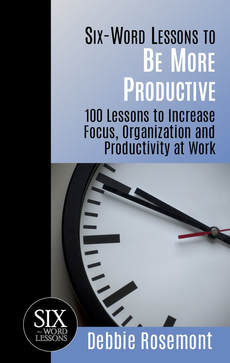 Do you ever glance at the clock just before 5pm when the workday has almost come to an end and ask yourself, “what did I accomplish today?” Are there days when you feel like you just couldn’t accomplish anything on your “to do” list? One thing we recommend to our clients in this situation is to use a time log to track how they spend their time. You can create your own time log by creating a spreadsheet that has the time you start your workday to the time you end your workday. Not an Excel wiz? No worries, this exercise can be accomplished just as easily by taking out a piece of paper and writing time slots down the left hand side. We recommend using 15 minute increments. Next to the window of time, write down what you worked on or did. For example, write down what you did from 9am to 9:15am, 9:15am to 9:30am, etc. Did you check your email, talk on the phone, talk with a co-worker, work on a project, file, surf the internet, etc.? Block off some time on your calendar right now to create a time log. Once your time log has been created, make it a priority to keep track of your daily activities for the next few days. Be brutally honest about how you spend your time; remember, this is only for your benefit. Keep your log close by so that it is easy to update throughout the day. The purpose of this log is to raise your awareness about how you currently spend your time. Once you have a few typical days worth of your time logged, take some time to review it. You may be surprised to see where your time goes. Check back for our next blog post on how to review and analyze your time log. Don’t want to create your own time log? We’ve created one for you and its included in our current package special, “A Shot of Time Management “. You’ll get a one hour consultation, a time log, our book, Six-Word Lessons to be More Productive and two 15 minute follow up calls to help you analyze your log and create an action plan for change. Contact us today to book your package.  Debbie Rosemont is a Certified Professional Organizer, Productivity Consultant and Trainer and Owner of Simply Placed. Simply Placed teaches organized systems and productive habits that allow busy professionals to maximize their time, focus on their priorities, reduce stress, improve their customer service and increase their bottom line. She is the author of Six-Word Lessons to Be More Productive.
0 Comments
 What is accountability? Accountability is defined by Webster’s Dictionary as “the quality or state of being accountable; an obligation or willingness to accept responsibility for one’s actions.” Accountability is a willingness to accept responsibility for our own actions. The benefits of an accountability partner Motivation helps get you started, but in order to stay on track and sustain the results, you need an accountability partner! When we commit to something to another person, we are much more likely to follow through. Studies show that if you have an accountability partner, you’re 65% more likely to compete a task and you’ll increase your chance of success by up to 95%! Do you have someone to help you keep your goals moving forward? If not, you would be surprised to learn how motivating and powerful it is to be accountable to someone. Once you choose your partner, here are a few ways to get started:
Sharing your goals with someone else creates a lot more energy and momentum to follow through, keep at it, and work through challenges. An accountability partner is a highly effective way to increase your productivity – personally and professionally. If you don’t already have an accountability partner, think about someone you could ask. Because this is a two-way relationship (in return, you hold them accountable for what they’re working on), it’s a win for them as well. Accountability in action In February, our “It’s About Time” virtual productivity program will focus on Accountability in Action. Participants will learn how accountability works as a productivity strategy, how to choose a partner to hold them accountable, structure the relationship, conduct check-ins and much more. If you could benefit from this, or other productivity strategies, we’d love to have you join our group! Are there other productivity challenges you’d like to overcome? Do you need an accountability partner that won’t let you fail? We play that role with our Six-Month Productivity Transformation Package clients. It’s a valuable part of the program that leads to results. Schedule a free discovery call and let us help you make this your most productive year, personally and professionally. With accountability, you will stay on track and sustain the results!  Debbie Rosemont is a Certified Professional Organizer, Productivity Consultant and Trainer and Owner of Simply Placed. Simply Placed teaches organized systems and productive habits that allow busy professionals to maximize their time, focus on their priorities, reduce stress, improve their customer service and increase their bottom line. She is the author of Six-Word Lessons to Be More Productive.  Is overcoming procrastination a goal you’ve set for your life or work this year? Is there something you’ve been putting off because it seems overwhelming, won’t deliver immediate results or for which you lack clarity? It starts with changing your habits Procrastination is one of the biggest roadblocks to productivity. You can avoid procrastinating on something that is important to you by changing your habits and making it a priority. While that sounds like common sense, there are several strategies you can use to establish more productive habits and overcome tendencies to put things off. Here are a few things to try:
This month in our “It’s About Time” virtual productivity group, our topic is “What Are You Waiting For?” If this a question that resonates with you, we can also help you learn valuable strategies that will help you get “unstuck”, overcome procrastination and get priority work done. Could you use some help overcoming procrastination? We work every day with private clients in productivity coaching sessions to identify their goals, remove barriers and time wasters, planning and prioritizing their time and creating effective systems so that they accomplish what they want, with less stress, and have more time for what matters most to them. Are there productivity challenges you’d like to resolve? Schedule a free Discovery Call today and let us help you tackle what is holding you back. Next time you feel there is something you are procrastinating on, take the first step – just a small one. The momentum you will gain from that will propel you forward toward your goal.  Debbie Rosemont is a Certified Professional Organizer, Productivity Consultant and Trainer and Owner of Simply Placed. Simply Placed teaches organized systems and productive habits that allow busy professionals to maximize their time, focus on their priorities, reduce stress, improve their customer service and increase their bottom line. She is the author of Six-Word Lessons to Be More Productive. 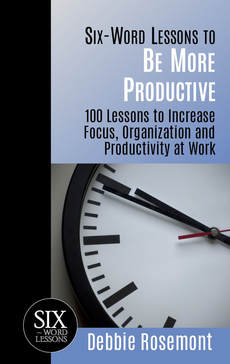 Have you resolved not to resolve this year because setting goals just hasn’t worked well for you in the past? Did you set goals for 2020 that you weren’t able to achieve, given how the year unfolded? Selecting one goal for the start of the year is a good start (it allows you to channel time, energy and efforts in a focused way), but just setting the goal is really about having an intention. What you do or don’t do from there will determine your outcome. It has been said before that an intention with no action is just a dream. Dreams aren’t bad, but if we want to turn them into reality, we need to pair them with action. Desire and determination are a good place to start, but motivation (your “why”), a specific action plan to which you are committed, and some accountability will get you a lot farther towards and ultimately to your destination. Know Your Why Once you’ve settled on your one goal, think hard about why you want to achieve that goal. What will success in the area you’ve selected do for your life, your relationships, your business, health, finances or anything else you hold as valuable? The answer to this is typically your motivation for moving forward. Visualize success. Consider posting pictures, words, or some other visual trigger to remind you about your goal, what success looks like, and what you’ll feel, see, have, or be able to do once you achieve the goal. Make reviewing this vision board, affirming statement, or other visual a part of your morning routine. Focus your mind on what you want and why you want it each and every day to help you focus on the steps you’ll need to take for success. Create an Action Plan Be very specific about what you want; set a SMART goal. Then start plotting a course backwards from your end goal. What do you need to do to achieve this? Write down all the steps, big or small, that you need to take to achieve your goal. Consider how much time you’ll need for each step. Flushing out the steps involved is important for a number of reasons:
Embrace Accountability Tell co-workers, trusted advisers, friends and others in your personal and professional network what you’re up to. Tell a number of people, or enlist an Accountability Partner. Share with them your goal, your “why” and your action plan. Ask them to help hold you accountable. When we commit to something publicly, we are much more likely to follow through, because we know someone we have told, may ask us about our progress or our success. Instinctively we want to please, so while you are not completing your goal for anyone other than yourself, you will be motivated to have positive things to share with those who are in the know. Consider setting up a regular time that you’ll “report in” on your progress; weekly, for example. This ensures that you don’t go too long without addressing challenges you may face, fessing up to inaction, or celebrating your small wins along the way.  Debbie Rosemont, Certified Professional Organizer and Productivity Consultant, started Simply Placed, in 2003 to help clients increase productivity, maximize efficiency and bring balance and control into their work and lives. Simply Placed associates work with individuals and businesses to create effective organizational systems, clear clutter, successfully manage time, focus on priorities and achieve goals. They help people work smarter, not harder, to increase their bottom line and peace of mind through consulting, hands-on organizing, and group training. They can be contacted at 206-579-5743 or [email protected]. 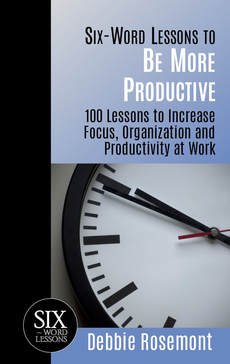 Many people are being asked to temporarily work from home, if possible, during the current COVID-19 outbreak, and some are choosing to do so voluntarily. Working from home does have its benefits, including no commute, the ability to wear pajamas “to the office”, and being a little more flexible in your schedule. However, it also comes productivity challenges. With several schools being closed and kids also home, some people might fall into the trap of it feeling like a “weekend” or holiday. But most people still have work deadlines to meet and projects to complete. If you are prone to procrastinate, struggle with staying focused or have trouble sticking to a routine or schedule, we have some strategies that can help you get over these hurdles and get your priority work done from wherever you may be.
It is also important that you plan breaks to step away from your work at regular intervals. For example, take a half hour a couple times each day to get outside for some fresh air and take the dog for a walk around the block – it’s a win/win for you and for the dog! Remember the same good practices you use at your office for how often you are checking text messages, social media and the stock market. Once you finish your priority work for the day, leave “the office”. Remember to maintain work/life harmony and not work past your usual hours just because your office is just down the hall. Shut down your computer and spend some extra time when you would otherwise be commuting to connect with your family in whatever way is meaningful for them and for you. And remember, working from home doesn’t mean you need to live in total isolation (unless you are under quarantine). If everyone is healthy, you can still meet up with your work team in small groups, if necessary, or get together outside for a hike and some team building time in nature. Just be sure to practice smart habits like good hand-washing and consider alternate greetings to shaking hands.  Debbie Rosemont, Certified Professional Organizer and Productivity Consultant, started Simply Placed, in 2003 to help clients increase productivity, maximize efficiency and bring balance and control into their work and lives. Simply Placed associates work with individuals and businesses to create effective organizational systems, clear clutter, successfully manage time, focus on priorities and achieve goals. They help people work smarter, not harder, to increase their bottom line and peace of mind through consulting, hands-on organizing, and group training. They can be contacted at 206-579-5743 or [email protected].  It is hard to be productive when we are feeling stress in our lives. We are living through unprecedented times right now. Many things are outside of our control, but getting a handle on what we can control is the best way to move forward through the stress. Whether it is taking time to process our feelings and emotions, or extra time to practice self-care, these few things can help bring a sense of predictability to an unpredictable time. Consistent habits alleviate stress On days that feel too overwhelming, maintaining consistent habits can help alleviate feelings of stress. When you follow a predictable routine in your day, it will help you be more productive, keep your priorities in focus and be of better service to others in your life. Routines and habits are comfortable to fall back on when we are feeling unsettled. Set small goals to complete every day until they become productive, healthy habits. Soon these small tasks or goals will become second nature for you. When you have a set pattern of tasks, activities or habits, at some point they become instinctive. You just DO them without even thinking about them because you know the result will be worth it in the end. Routines for a productive day Here are six simple strategies to help you re-establish some routine in your life so that you can get more done, focus on your priorities AND have time for what matters most to you.
Set small goals to complete every day until they become productive, healthy habits. Soon these will become second nature for you and you’ll find yourself less stressed and more productive.  Debbie Rosemont, Certified Professional Organizer and Productivity Consultant, started Simply Placed, in 2003 to help clients increase productivity, maximize efficiency and bring balance and control into their work and lives. Simply Placed associates work with individuals and businesses to create effective organizational systems, clear clutter, successfully manage time, focus on priorities and achieve goals. They help people work smarter, not harder, to increase their bottom line and peace of mind through consulting, hands-on organizing, and group training. They can be contacted at 206-579-5743 or [email protected]. 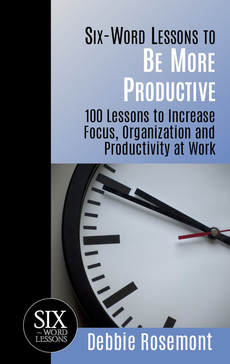 “The more you express gratitude for what you have, the more likely you will have even more to express gratitude for.” —Zig Ziglar Who was the last person you thanked? Do you remember how it made you feel? When we pause and reflect on someone or something we are grateful for, that brings a shift in our emotional state and consciousness that has many benefits. Practicing gratitude makes you more productive Studies have shown a correlation between gratitude and improved health, but did you know that taking just a couple of minutes each day to practice gratitude also help you to be more productive at work and at home? Beyond making you more productive, practicing gratitude makes you feel less stressed and can help you to sleep better at night. When you are relaxed and well-rested, you will be more effective and efficient at carrying out tasks and achieving goals. Gratitude feels good A feeling of gratitude can have an overall positive impact on your health and well-being. Practicing an attitude of gratitude is one of the easiest and most effective habits to embrace. When you’re in a thankful mindset, you’re better equipped to meet the challenges of your day. Giving thanks has as many benefits for the person who is handing out the appreciation as it does for the recipient. Gratitude releases dopamine, and makes everyone feel better. And when gratitude is given at work, did you know it can make you more productive? When people are thanked for a job well done, it motivates them to work harder. The best part is that it doesn’t cost you anything to recognize and appreciate people for their efforts. How we think, and ultimately what we say aloud and write down, has a tangible impact on how we feel. Try incorporating simple statements of gratitude every day at work, for things both big and small. Practicing gratitude is easy Research on the effects of gratitude have found that people are more likely to make progress on their goals when they write down the things that they are grateful for. What are some ways you can practice gratitude?
Spending just 5 minutes each day thinking about what you are grateful for trains your mind to focus on the positive things in your life. Expressing thanks is a great thing to practice, and adding it to your collection of daily success habits can help you be more productive, as well. To help you get started, there are some terrific apps that you can use, such as “The Five-Minute Journal”. If you start and end your day with a mindset of gratitude, you’ll be more productive and successful at reaching your goals. Expressing thanks can lead to feeling healthier and happier, so it’s a great thing to practice often. Adding it to your collection of daily success habits can help you be more productive as well. Reflect on and express gratitude for the things and people in your life. Try and make this a daily habit: it’s good for your health AND your productivity! Want more strategies, motivation and accountability to live your most organized and productive life, and to have more time for what matters most? Join Simply Placed’s It’s About Time – Virtual Productivity Program. Register today and then email [email protected] to request a free copy of Six Word Lessons to be More Productive, as our gift to you to thank you for joining the program. Here’s to your organized and productive life!  Debbie Rosemont, Certified Professional Organizer and Productivity Consultant, started Simply Placed, in 2003 to help clients increase productivity, maximize efficiency and bring balance and control into their work and lives. Simply Placed associates work with individuals and businesses to create effective organizational systems, clear clutter, successfully manage time, focus on priorities and achieve goals. They help people work smarter, not harder, to increase their bottom line and peace of mind through consulting, hands-on organizing, and group training. They can be contacted at 206-579-5743 or [email protected]. 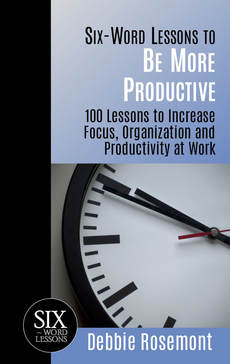 Want to ensure you have an organized and productive day tomorrow (and every day after that)? Here are six simple strategies you can implement to increase your daily productivity. It’s amazing what a big impact small change can have. Follow these tips to save time, money and stress and to get the most out of your day. 1. Get seven to nine hours of sleep each night. Everyone needs a different amount of sleep to feel rested, rejuvenated and ready to be productive, but studies show that for most people, between seven to nine is ideal. Try to go to bed and wake up at the same time each day. Follow a familiar bedtime routine, limiting “before bed” activities to things that relax you and help you wind down. You will enjoy the benefits of more energy and of feeling well rested while you work. You will also be more productive and efficient. 2. Plan out your week. Finish your week by reviewing projects and tasks accomplished and looking ahead to the next week to see what the priorities will be. Make sure you have time allotted on your calendar to work on these priority projects and make strides towards your goals. Take time over the weekend to have a family meeting and discuss everyone’s plans for the week ahead (who will be home for dinner what nights, who has commitments or activities?) This will help you to plan meals, plan transportation and will ultimately save you time and money in the week ahead. 3. Do as much as possible the night before. Set the coffee pot on a timer so it is ready and brewed when you come down for breakfast. Pack up your gym bag the night before. Set dry cleaning or any other items you need to take for activities or errands the next day right by the door. Pick out the outfit and accessories you’ll wear so you can ensure what you want is clean and ready to go. By doing these things the night before, you will make your morning less hectic. 4. Prioritize your work day. Once you arrive at your office or as you start your day at home, immediately plan and prioritize your day. (Alternatively, this can also be done at the end of the day for the next so that you can come in and hit the ground running). Focus on high-priority activities first. Eliminate distractions (turn off email notifications, send your calls to voicemail, put a “do not disturb” sign on your door) for periods of time so that you can really dig in, uninterrupted and make great progress on those priority tasks and projects. 5. De-clutter. Take a few minutes at the end of each day to tidy your desk or space at home where you get things done so you have a clear space at which to work, free of distraction. Put supplies back where they belong, file loose papers, put books and binders back on shelves and take a few minutes to get organized. At home, enlist family members in a “Ten-Minute Tidy” to scurry around, room by room (you may need to do ten minutes in each heavily used room) to put things back where they belong. This makes it so much easier to find what you need, when you need it! 6. Schedule appointments with yourself. Block off time in your calendar to regularly de-clutter and organize. If you don’t schedule time to do this, it won’t happen. Take time to purge old papers you don’t need, supplies you no longer use and to weed out old files. Consider biting off a small area to organize in just 30 minutes. Make this a weekly habit and you’ll tackle all sorts of areas in your office and home. Likewise, block off and protect chunks of time on your calendar for high priority activities. If you know there’s something you want to get done in a given day, make an appointment with yourself and then honor that time (meaning when the appointment rolls around, work on that task or project). Seeing the appointment visibly can also make it easier to say “no” to something or someone else that might serve as a barrier to your productivity on the priority. Want more strategies, motivation and accountability to live your most organized and productive life, and to have more time for what matters most? Join Simply Placed’s It’s About Time – Virtual Productivity Program. Register today and then email [email protected] to request a free copy of Six Word Lessons to be More Productive, as our gift to you to thank you for joining the program. Here’s to your organized and productive life!  Debbie Rosemont, Certified Professional Organizer and Productivity Consultant, started Simply Placed, in 2003 to help clients increase productivity, maximize efficiency and bring balance and control into their work and lives. Simply Placed associates work with individuals and businesses to create effective organizational systems, clear clutter, successfully manage time, focus on priorities and achieve goals. They help people work smarter, not harder, to increase their bottom line and peace of mind through consulting, hands-on organizing, and group training. They can be contacted at 206-579-5743 or [email protected].  When you strive for perfectionism, it’s easy to be disappointed. We’re all human. Some days (and especially lately), it is enough just to do a good job; striving for perfection can be exhausting and entirely unnecessary. Most of the time, “done” is better than perfect! Perfectionism: the #1 cause of procrastination Many people view perfectionism as a positive attribute, but in truth, perfectionism can actually be very harmful to your success. Its important to feel a sense of satisfaction and accomplishment when you complete a task or project. Perfectionists are rarely, if ever, satisfied. Perfectionist tendencies can be limited to certain areas or activities. For example, perfectionism could be based on cleanliness, scholastic standings, table manners, athletic skills, work product, etc. Perfectionism is a major productivity killer. When we are struggling with multiple priorities in our lives and on our plates, sometimes just checking a task off your list will set you on a better path to productivity than trying to do the task “perfectly”. Momentum can be powerful. Perfection can lead to paralysis – the inability to even make ANY forward progress, let alone complete something. You never feel like you are doing something well enough, so it goes unfinished. Some days, though, what you feel is just “good enough” might be “perfect” to someone else! Shift your perspective and just make progress. Perfectionism may just be a roadblock that you can overcome by trying a few strategies. Strategies to beat perfectionism paralysis
Remember a few of my favorite Mantras:
Is this speaking to you? You’re in good company. I’m a Recovering Perfectionist! Is there something you are putting off or procrastinating on because you feel you can’t complete it “perfectly”? If so, you are in very good company! The good news is there are ways to break free from this cycle. I could easily be stuck in a cycle of perfectionism just writing this blog post, for example. Did I share enough helpful information? Did I miss sharing something important that could benefit someone? But at some point, I just need to know I did the best I could, at this moment. It might not be perfect to me, but it might be perfect to you, and better than not sharing anything at all. Let us help you break out of your cycle of perfectionism, if that is stopping you from getting things done. Contact us to learn how we can help you to move forward on your to do list and be free of perfection paralysis! This is a popular coaching topic that clients of our Six-Month Productivity Transformation package work through to accomplish what they want in less time. Schedule a free Discovery Call with Debbie if you’d like to learn more about that package and how coaching can help you accelerate your results with greater ease. Have more time for what matters most!  Debbie Rosemont, Certified Professional Organizer and Productivity Consultant, started Simply Placed, in 2003 to help clients increase productivity, maximize efficiency and bring balance and control into their work and lives. Simply Placed associates work with individuals and businesses to create effective organizational systems, clear clutter, successfully manage time, focus on priorities and achieve goals. They help people work smarter, not harder, to increase their bottom line and peace of mind through consulting, hands-on organizing, and group training. They can be contacted at 206-579-5743 or [email protected].  Are you feeling pressure to “be productive” with things around the house while you’re spending more time at home? There are lots of posts and encouragement to tackle big projects during the new-found “downtime” everyone supposedly suddenly has on their hands or to “keep busy” to ward off boredom. Maybe you don’t have much, if any, “extra” time on your hands. Perhaps you’re processing this pandemic and all the changes it has brought and find you actually need LESS to “do” right now, not more. Maybe you’re home-schooling children while working part or full-time from home, as well. First and foremost (and not that you need it), we give you permission to just “be” when you need to. Focus on the fundamentals of your physical wellbeing, your mental wellness, taking care of yourself, your family and your required work. Busy, versus productive Doing projects around the house or extra things for work might not be a priority right now and that’s ok. Being “busy” does not equal being productive. Our definition of productivity is “achieving desired results” and right now your desired result might be to take care of the basics and preserve your energy for yourself and others. In addition to having stages of processing, and each stage requiring different things from us, we may have different levels of energy on any given day while we process. Some days you may need more rest. Some days you may only have the energy for what is non-negotiable in your work or life, and some days you may want to engage in something new, different or meaningful to lift your spirits and feel particularly accomplished or valuable. Honor your energy. Honor your needs. But when you have the energy, here are a few ideas! For those days when you have the energy or desire for something else to do, we’ve created a list of shorter duration projects and activities, many of which can be done in under 30 minutes. These could provide a break from work and schooling and/or leave you feeling like you’re doing something to better yourself or your future situation. You could pick one on any given day, or if you do find that you have the time and motivation to work on a bigger project, combine any number of these for a project that may take a couple of hours, a half day, or even a full day. For example, all closet-related tasks could become a total clean-out and organization of the closet session if you have the time, energy and will. In this series of posts, today we will focus on improving or completing quick tasks around your home. As you’re spending more time there, you may be looking around noticing clutter, that things aren’t arranged in the way that you want, or may just be looking to streamline or make things easier or better. Below are a number of relatively “quick hit” ideas for accomplishing some of that. Remember, you can combine several that logically can go together (or relate to the same space at home) if you have a longer chunk of time or the desire for more significant change at once.
Want more clutter-clearing motivation? Over the next week, we’ll be building on to this list to include specific spaces around your home, work-related organizational tasks that can help you to be more productive, self-care and personal development activities, and activities you can do to tap into your creative side or nurture others. If you’re looking for some additional clutter-clearing motivation, consider a membership in our “It’s About Time” virtual productivity program. During the month of April, we will be focusing on Minimalism, clearing clutter and organizing your physical space and stuff. Want to release over 450 items from your home, office and life in just 30 days? Join us for our Minimalism Challenge, starting April 1st, 2020! Note: the video associated with the Minimalism Challenge link, above, was recorded for last year’s challenge, which was held in May. We are excited to be starting the challenge this year today, April 1st, as it seems like the right time.  Debbie Rosemont, Certified Professional Organizer and Productivity Consultant, started Simply Placed, in 2003 to help clients increase productivity, maximize efficiency and bring balance and control into their work and lives. Simply Placed associates work with individuals and businesses to create effective organizational systems, clear clutter, successfully manage time, focus on priorities and achieve goals. They help people work smarter, not harder, to increase their bottom line and peace of mind through consulting, hands-on organizing, and group training. They can be contacted at 206-579-5743 or [email protected]. |
See the Authors!
All
|

 RSS Feed
RSS Feed